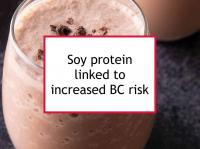A new study has reported that a diet rich in soy protein may influence cell signaling in ways that increase breast cancer risk. The study was designed to investigate whether intake of tomato products and/or a soy protein supplement can modify circulating levels of insulin-like growth factor 1 (IGF-1) and other markers of cell signaling.
Study participants were enrolled in a 26-week, two-arm (tomato and soy, 10 weeks each) dietary intervention trial in which each woman served as her own control. Circulating IGF-1, IGF binding protein 3 (IGFBP-3), estradiol, sex hormone binding globulin (SHBG), c-peptide, and insulin levels were measured at the beginning and end of each intervention period.
The tomato-rich diet was found to have little effect on cell-signaling biomarkers previously associated with risk of breast cancer. However, the soy protein supplement intervention resulted in small, but significant, increases in concentrations of IGF-1 and IGFBP-3, as well as a reduction in SHBG. Like increases in insulin-like growth factors, low levels of SHBG have been hypothesized to promote cancer growth. The authors comment that previous epidemiological studies, however, have confirmed soy's protective effect on breast cancer. Additional investigation regarding the effect of soy on breast cancer risk and its mechanism of action appears warranted.
Comments regarding the study
The authors appeared to expect that a diet enriched with soy protein would influence insulin-like growth factors and sex hormone binding globulin in directons consistent with a reduction in breast cancer risk, much as has been found for dry beans (see Mechanisms Associated with Dose-Dependent Inhibition of Rat Mammary Carcinogenesis by Dry Bean (Phaseolus vulgaris, L.) below). Instead, soy protein induced changes in these markers that are consistent with increased risk of breast cancer. This finding is congruent with other studies that have found troubling associations between soy protein isolate and breast cancer.
Soy foods appear to be variable in their influence on breast cancer risk. Based on the available evidence, the soy products most commonly consumed in the U.S., namely soy protein isolate (found in numerous processed foods, including protein bars and soy infant formula and soybean oil, may increase breast cancer risk directly or indirectly. On the other hand, tofu, edamame and tempeh may reduce breast cancer risk, depending on the age at which they are consumed, or at least not contribute to increased risk. Please see our articles on these foods and on genistein and daidzein (the phytoestrogens in soy) for more complete information.
